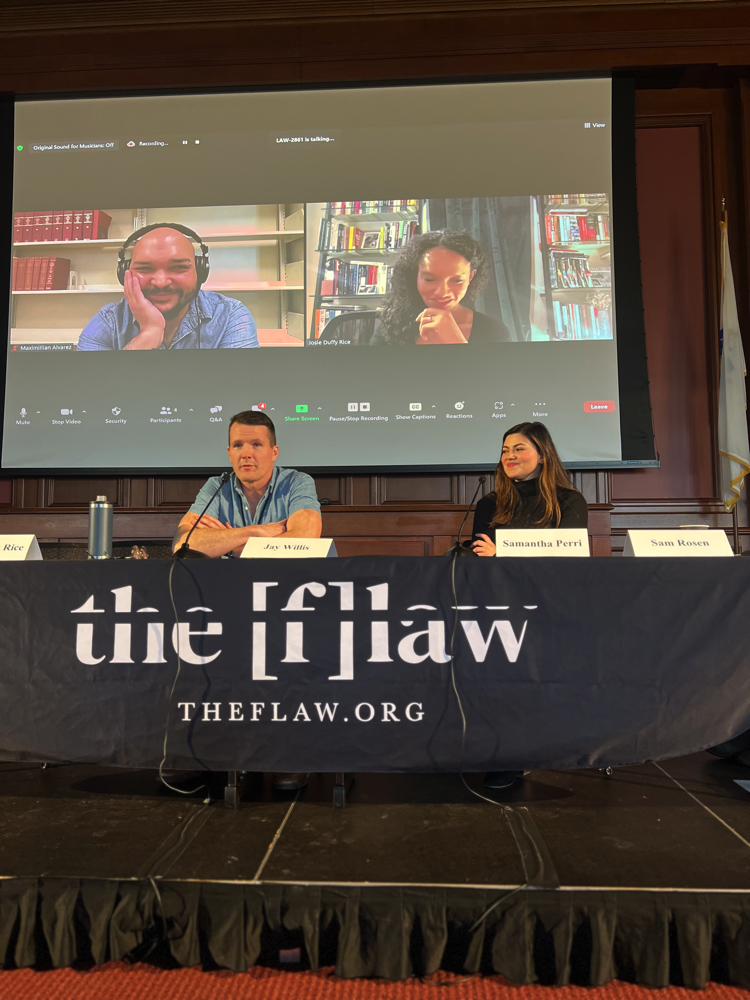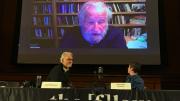How have corporations influenced the way law is taught, practiced, and discussed, as well as the very legal system itself? At a January 27-28 Harvard Law School conference, critics of contemporary law—students, attorneys, legal commentators, and public intellectuals such as Noam Chomsky, LL.D. ’00—convened to discuss the subject, and the means by which law students can challenge this “corporate capture of the law.”
The conference sprang from Stone professor of law Jon Hanson’s Critical Corporate Theory Lab, a seminar in which students research and write essays about how “corporate law and power create social problems and systemic injustices.” In the fall of 2021, the students began publishing these essays in a magazine they launched called The [F]law. Hanson and his students conceived of the conference as a complement to and extension of articles printed in its second edition.
Student contributors to The [F]law and invited speakers—including Ralph Nader, LL.B. ’58, Chomsky, Senator Sheldon Whitehouse, and Briahna Joy Gray ’07 (host of the Bad Faith podcast)—discussed their perspectives on how corporate interests have infiltrated and warped legal education, the legal profession, and the legal media, as well as the law, the judiciary, and legislative politics.
In his remarks, Chomsky cited a still-applicable insight from Adam Smith, who argued—in his own time—that “‘the masters of mankind,’ the people who own the economy…are the ‘principal architects’ of state policy, of all other institutions, and they make sure that their own interests are ‘most peculiarly attended to.’” Gray discussed how corporations leverage their wealth to influence the content of legislation, while Whitehouse described how “dark money” political-action groups, fueled by corporate funds, work to choose the people who interpret that legislation. The Judicial Crisis Network is one such group, he said, spending “tens of millions of dollars getting [Merrick] Garland [’74, J.D. ’77] stopped, and [Neil] Gorsuch [J.D. ’91] and [Brett] Kavanaugh and [Amy Coney] Barrett onto the [Supreme] Court.”
Lawyers aren’t innocent in this process of corporate capture, according to the conference speakers.
In the [F]law, Hanson writes (with second-year students Lisa Fanning and Simone Unwalla) that corporate lawyers “are not providing ‘advice and guidance’ regarding a given body of law.” Instead, “they are active participants in the manipulation of the law that enables corporations to evade liability and inflict harm with impunity.” During a panel in which [F]law contributors presented their research, second-year student Delana Sobhani explained how corporations deploy bankruptcy to shirk responsibility for harms they’ve caused, relying on the collaboration of corporate lawyers who “lie,” she wrote in her corresponding [F]law piece, to justify this strategy.
The conference explored how law students—many of whom enter law school motivated to do good and address injustices—end up in these corporate jobs. The process starts with aggressive recruiting, according to students who spoke on a panel about the “Corporate Capture of Legal Education and the Legal Profession.” According to Fanning, “Seventy percent of our students will go into Big Law, and a lot of those students do it not because they have this dire need to support their family back home…[but] because it’s an easier path,” paved with free T-shirts, water bottles, lunches, dinners, and entertainment.
“Is it kind of fun to go to a Big Law reception and hobnob over fancy cocktails and appetizers? Sure, yeah,” said Molly Coleman J.D. ’20, the executive director of People’s Parity Project (PPP), which seeks to “demystify—and dismantle—the coercive legal tools that have stacked the system against the people.” One of its current projects involves bringing attention to and fighting against coercive contracts, such as class-action waivers and non-disclosure agreements, which—according to the project—were “invented by corporate lawyers” in order to “silence victims of harassment, discrimination, and other illegal abuse.”
“[But] is it more fun to go protest at a law firm?” Coleman continued, speaking on a panel on “Challenging Corporate Power by Agitating, Educating, and Organizing.” “Yeah, for sure. That’s way more fun.”
Hanson said in an interview that PPP was an excellent example, for students, of the meaningful, “system-changing work” open to them post-graduation.
For those who can’t shake their risk aversion, Hanson said, there’s the anti-corporate—but still reasonably stable—option of joining a plaintiffs-side firm. During a panel on “Justice-Oriented, Counter-Corporate Plaintiffs-Side Lawyering,” students in the audience of hundreds heard from attorneys like Jayne Conroy, who has fought the manufacturers and distributors of opioids on behalf of communities affected by the overdose epidemic. “Those [plaintiff-side] lawyers actually get paid pretty well. Some of them very well. And their jobs look a lot like the jobs of the Big Law defense firms,” Hanson said after the conference. “The idea [behind that panel] was to really elevate that option for students to consider. If their financial situation is such that they’re not able to do other kinds of work, they can still be working to push against the hegemonic power of corporations.”
Student panelists discussed how those who disparage corporate law are often chastised with the line that “Everyone—including corporations—deserves a lawyer.” Marty Strauss, a third-year student going into public defense work, said, “My favorite response…is, ‘Well, that doesn’t mean they deserve you.” “Why,” he asks those who choose a corporate career, “are you so willing to give up your agency and your one shot at making justice real and pursuing a transformative legal career?”
Ellie Olsen, a second-year student, argued that there’s a false equivalence drawn between representing a criminal defendant and a corporate defendant. “In a criminal case, we have the weight and power of the government arrayed against one single individual,” she said. By contrast, “The power of the law is already stacked in favor of the corporation.”
On a live recording of the 5-4 Pod podcast, (self-described as a program “about how much the Supreme Court sucks”), Rhiannon Hamam similarly pushed back on the rhetoric about the right of corporations to representation. “That is an argument in bad faith,” she said. “It is an honor to stand shoulder-to-shoulder [with] and stand up next to somebody who’s too poor to hire an attorney and who’s accused by the state of doing something wrong.” But “there’s no honor,” she believes, in standing shoulder-to-shoulder with a corporation.

Jay Willis and Samantha Perri
Photograph by Michael Roh
Samantha Perri, a third-year student going into public defense, said in an interview that the podcast was among the many highlights of the conference, which she helped organize. “It just felt very raw and honest,” she said. It’s not often at the Law School, she said, that people are willing to critique “what’s actually going on behind the scenes.”
Aaron Nytes, a second-year student also involved in planning the conference, said in a post-conference interview that several attendees had expressed to him that “It’s really nice to see the community of people who are interested in more than just private law and making a bunch of money.” This community includes law students at Boston University and the University of Massachusetts Amherst, among other New England institutions, who—according to Hanson—had the opportunity join their Harvard peers for a non-public dinner with plaintiff-side attorneys.
“It was a triumph,” Hanson declared of the conference. Will it happen again? “My instinct is, the answer is yes.” In his closing remarks, Hanson drew the crowd’s attention to the space in which they were gathered. “This is a room that transcends,” he said, gesturing up at the high ceilings, which are painted a striking cerulean shade of blue. “You see the clouds up there—it’s gorgeous.” He exhorted the audience to remember that the beauty of the room, which perches at the top of HLS’s Austin Hall, belies an ugly history of money, greed, and corporate power. “The people who paid for this building and paid for the way we teach law were the beneficiaries of the vision that would…justify the existing laws at the time that placed property and property rights above all else.”
Juliet Isselbacher is a senior in philosophy working on a thesis about non-evidentialist epistemology and its intersection with the #MeToo movement.









